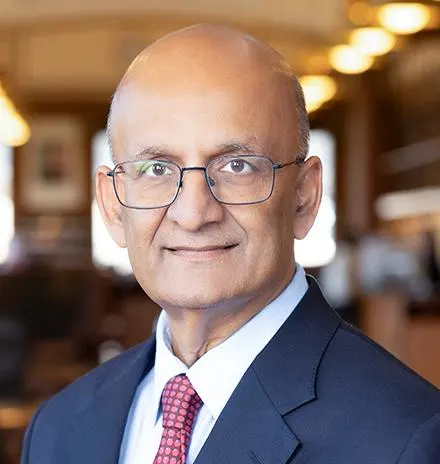When Harvard Business School Dean Nitin Nohria first moved from India to the United States more than 30 years ago, he was impressed with how well the highways and airports hummed along in this country.
Yet Nohria said in recent years he has visited other countries with better airport operations and much bigger, "gleaming" roadways, and he feels a growing concern that America's transportation and infrastructure systems are lacking attention and falling behind.
We suffer through an extremely aged and outdated infrastructure
It's a problem that is an "urgent, vital issue for those who care about the renewed, continued competitiveness of the United States," he told attendees who gathered recently at the national summit held at HBS, America on the Move: Transportation and Infrastructure for the 21st Century.
According to HBS Professor Rosabeth Moss Kanter, who conceived and led the conference, everyone agrees that infrastructure is important and that problems exist—but not for the same reasons. The result: a lack of agreement on solutions. "It's a public agenda item, but it has a lack of purpose," she said.
The summit, which brought together for the first time a wide range of top industry CEOs, government leaders, and customers of transportation services, was designed to help provide that purpose by assessing the state of the industry, identifying innovations both in technology and business models, and discussing possible funding sources. Additional information and data gathered from the event is expected to be distributed later this year.
"We need a vision that says transportation and infrastructure (are) important, so important that a lot of people have to come to the table and decide which projects should be invested in," Kanter said.
Speakers lamented the various infrastructure problems in the United States—congested roads, crumbling bridges, chronic airport delays, spotty wireless connections—and criticized the lack of investment in transportation and infrastructure in the last decade or longer.
Business has a stake in making sure improvements are made, since infrastructure is "extraordinarily powerful," with connectivity needed to support competition and the supply chain and transportation keeping our workforce mobile, said Dr. Patrick Gallagher, Acting Deputy Secretary of the US Department of Commerce.
"We suffer through an extremely aged and outdated infrastructure," he said. "We will struggle with two fundamental questions: How do we collectively own something so critical to our shared prosperity? And how do we make investments now in something that will benefit us later?"
Summit attendees worked on identifying "bottlenecks and pain points" while devising potential solutions to the country's infrastructure woes.
Many of the problems have a direct impact on business. For example, airline flight delays and cancellations cost an estimated $30 billion a year in economic impact, said Kanter, the HBS Ernest L. Arbuckle Professor of Business Administration.
Based on discussions during the summit, Kanter outlined some of the country's infrastructure needs:
Universal high-speed broadband, which can create jobs as well as facilitate solutions to congestion, safety issues, dynamic pricing; and automated vehicles.
Improving mass transit systems that connect to other forms of transportation.
Making the US easier for foreign visitors to enter.
An infrastructure bank to make targeted strategic investments through public-private partnerships.
Applying technology to upgrade the nation's air traffic control system.
Kanter acknowledged that the projects needed to address the country's infrastructure issues are not small, but noted that the US has a long history of taking on big national purpose projects—and we often forget that the road to completion was as rocky for those projects as it can be today.
The key lies in the fact that government and business want the same outcome
The Transcontinental Railroad, for example, was "politicized and corrupt," and the two ends almost didn't meet due to lack of coordination, but the project eventually came together and unlocked private sector innovation and drove growth opportunities for those living in communities located near train stations, she said. What the country needs today is another long-term "vision."
"Maintenance is not a vision," she said. "It's very hard to rally support around maintenance."
Summit participants had reason to feel optimistic that a long-term infrastructure plan might be hammered out.
On the same day that the summit began, February 26, President Obama called on lawmakers to approve a $302 billion bill to revitalize the nation's transportation infrastructure. In addition, House Ways and Means Committee Chairman Dave Camp, R-Mich., announced a plan to rework the tax code and dedicate $126.5 billion to fund highway and infrastructure investment.
Although the two sides remain far apart, the proposals suggest that the two parties may ultimately reach some sort of agreement on transportation funding.
The current two-year highway bill is set to expire Nov. 1, and the trust fund that relies on the gasoline tax is expected to run short of money during the summer highway repair and construction season, impacting funding that the states count on to pay for those projects.
"We have tended to live with a lot of short-term bills. You want long-term bills," Gallagher said.
General Electric Chairman and CEO Jeffrey Immelt (HBS MBA '82) said infrastructure problems in this country are painfully apparent in many ways, including the fact that he can't get cell phone service in his own home. He said broadband is one area with a potential to create a lot of jobs. "This is how societies become wealthy or lose their wealth—making smart or dumb decisions around infrastructure."
Tackling the country's infrastructure challenges, at times through public-private partnerships, can represent a "great investing opportunity" for companies like GE, he said.
"When you're a big company, you have to play in big places," he said. "We can bring the scale of our company to bear in our infrastructure challenges."
Besides, the business world stands to benefit from infrastructure improvements, said the Hon. Karen Gordon Mills (HBS MBA '77), former Administrator of the US Small Business Administration and a senior fellow at HBS, noting that public-private partnerships can be "powerful."
"When we think about infrastructure spending, we think about the immediate effect on demand," she said. "If you repair a bridge, build a port or airport, you are immediately employing people and they are spending money."
Some may question whether transportation infrastructure is as necessary in this digital age, but Kanter noted that highways are still used most for work commuting.
"Even if we say the world is going digital, we still need physical infrastructure," she said. "If we did all of our shopping over the Internet, someone has to get (packages) to you."
And in fact, the poor tend to live in neighborhoods with the fewest transportation options, yet they're the ones who often have the greatest need for mobility. "They're the ones that can go digital less than anybody," she said. "They need face-to-face service jobs that tend not to be in those neighborhoods."
Kanter, who presented ideas garnered from the summit to US Secretary of Transportation Anthony Foxx, said the discussion at HBS was a good start.
"As far as we know, there has been no summit like this that combines the industries and the sectors (with) an emphasis on users," she said, "so we really hope to have an impact because of the ideas that are gathered here."
Mills said she was hopeful that progress could be made, especially if companies accept a role.
"The key lies in the fact that government and business want the same outcome here. If you take a small bit of the problem and you have enough constituencies coming from the business side, the stakeholders that matter, you can get something accomplished."
From business, attendees also included Richard Anderson, CEO, Delta; Mary Barras, CEO, General Motors; Thomas Donohue, President, US Chamber of Commerce; Lowell McAdam, CEO, Verizon; Charles W. Moorman (HBS MBA '89), Chairman, Norfolk Southern; Damon Silvers (HBS MBA '95), Policy Director and Special Counsel, AFL-CIO; Gerald Storch (HBS MBA '81), former CEO Toys R Us and CEO of Storch Advisors; Richard Trumka, President, AFL-CIO; and Michael Ward (HBS MBA '76), CEO, CSX.
From government, the participant list included Charles Bolden, NASA Administrator; Anthony Foxx, US Secretary of Transportation; Jane Garvey, former head of the Federal Aviation Administration; Hon. Rodney Slater, former US Secretary of Transportation; and US Sen. Elizabeth Warren.
Further reading from Rosabeth Moss Kanter
Big Data in the Driver's Seat
What Good Are Airports If You Can't Get There?
Private Investors Can Save Public Infrastructure


